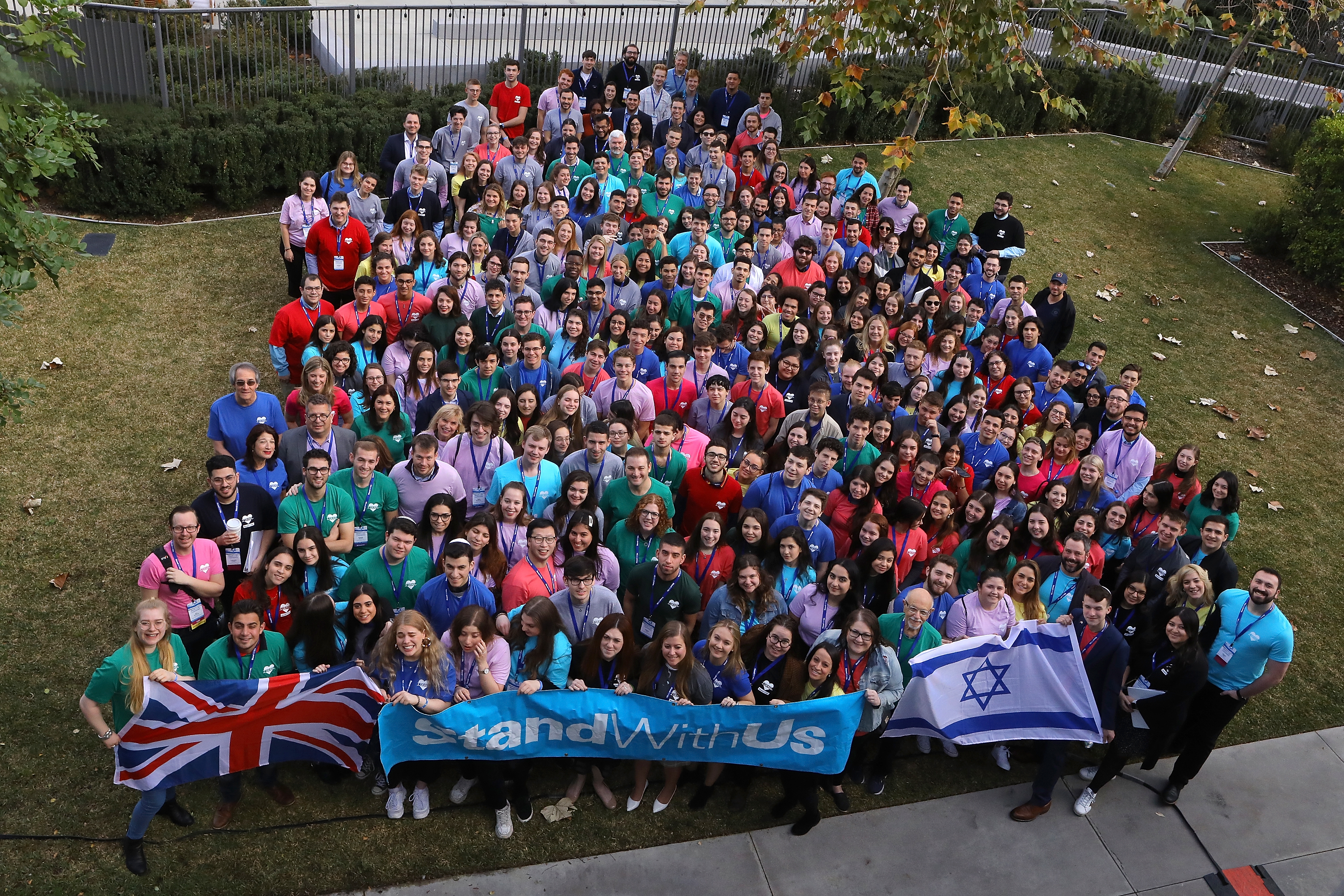 Photo courtesy of StandWithUs.
Photo courtesy of StandWithUs. Under the banner “Israel in Focus,” this year’s StandWithUs (SWU) International Conference focused on educating students about anti-Semitism and how to fight it.
The pro-Israel educational organization’s conference was held at the Hyatt Regency Los Angeles International Airport hotel over the Jan. 17-19 weekend, and was sponsored by the Adam and Gila Milstein Foundation.
Addressing the 550 college and high school students and community members in attendance, Adam Milstein said anti-Semitism had been dormant since the end of Holocaust but has been making a comeback over the last 15 years.
“The reason why it’s so popular in the United States is because it started on the campus and it was permitted on the campus,” Milstein said, noting that organizations like Students for Justice in Palestine (SJP) and far-left professors on college campuses have perpetuated anti-Semitism under the guise of criticism of Israel, and anti-Semites are following suit.
“Everyone uses the language of the [Boycott, Divestment and Sanctions] movement,” Milstein said. “We allowed the BDS movement to make anti-Semitism legal and promote violence on campus.”
He warned that if Jews don’t fight back, “We won’t have too many Jews here in the United States of America.”
“The only way to fight anti-Semitism is by waging an affirmative battle for who we are.” — Bari Weiss
At a panel titled New Trends in BDS on Campus, Rabbi Evan Goodman, executive director of Santa Barbara Hillel, said while he thinks that the BDS movement is shrinking, it still wields enough influence to affect political leadership on college campuses and instill “cancel culture” in pro-Israel groups like Hillel. Goodman said this was because BDS activists “no longer [want] to dignify other people’s perspectives.”
SWU Executive Director of Research and Strategy Max Samarov similarly said that the BDS movement has shifted its focus from getting companies to divest from Israel toward severing ties between people, citing the effort in 2019 to get Pitzer College to end its study abroad program with the University of Haifa, and McGill University’s student government’s attempt in December to pressure one of its members to cancel her trip to Israel at end of the month.
Academic Engagement Network Deputy Director Michael Atkins highlighted a trend among faculty members of hosting pro-BDS lectures and panels. “They are often presented as arguments,” Atkins said, “but they’re really sort of assertions without much opportunity for discussion and dialogue.”
Other panels and speakers discussed how anti-Semitism has become an issue in high schools. SWU Executive Director of High School Affairs Miri Kornfeld said there has been a “a rise in the number of swastikas and anti-Israel slurs and slogans” on high school campuses. It is imperative, she said, that students are educated on the Holocaust and anti-Semitism.
SWU Southwest High School Coordinator Kate Chavez said during the Anti-Semitism in High Schools panel at its training program for StandWithUs high school interns in August, 90% of the interns raised their hands when asked if they had ever experienced anti-Semitism on campus.
“It was a definitely a surprise for us,” Chavez said.
College and high school students on the Standing Up to Hate on Campus panel talked about their experiences. Sammy Gabbai, a student at Winter Park High School in Florida, said, “I’ve had coins thrown at me, calling me a Jew, been pushed around in the hallways by older classmen told ‘Get out of here Jew!’” She also said that a friend once drew four swastikas on her arm.
Throughout the conference, students shared how they have been fighting against anti-Semitism. Gabbai and Charlotte Latin High School student Abby Adams, who met through the SWU high school internship program, told the Journal they started an Instagram campaign called “Why I Wear My Star” two days after the Chabad of Poway shooting.
Adams said, “We were talking about it saying, ‘I wish there was a way where we could find positivity when things like this happen’ because we see so many people posting things online showing, ‘I’m sorry this happened.’ So we said, why don’t we start something like this ourselves?”
The “Why I Wear My Star” Instagram account currently has 82 posts and more than 2,000 followers. Non-Jews have also contributed to the campaign. Adams and Gabbai are now working to use the campaign as a platform for specific programs to fight anti-Semitism.
“We can’t wait to see where it goes,” Gabbai said. “Hopefully it gets bigger.”
Michigan State student Maddy Gun told conference attendees that a student vandalized her mezuzah in September 2019. Gun decided to do something about it since her grandfather, a Holocaust survivor, had always told her to never be a bystander. “I felt like as his granddaughter I had to carry this on,” she said.
Gun set up a meeting with the student as well as the campus Chabad and Hillel directors, where she told the student, “What you did is not OK and not acceptable.” The student agreed to take a guided tour at a local Holocaust museum. “Hopefully he got educated,” Gun said.
SWU Executive Director of Campus Affairs Rena Nasar First encouraged student attendees to contact SWU if they experience discrimination to discuss potential legal action.
“You, as a student, you as a community member, you have rights,” Nasar First said. “You should know what those rights are.”
New York Times columnist Bari Weiss, the keynote speaker for the conference, told attendees, “The only way to fight anti-Semitism is by waging an affirmative battle for who we are.”























 More news and opinions than at a Shabbat dinner, right in your inbox.
More news and opinions than at a Shabbat dinner, right in your inbox.